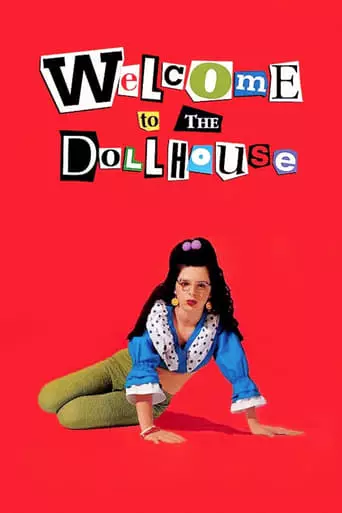An unattractive 7th grader struggles to cope with suburban life as the middle child with inattentive parents and bullies at school.
Welcome to the Dollhouse is a darkly comedic drama that offers an unvarnished portrayal of adolescence through the eyes of Dawn Wiener, a 12-year-old girl navigating the tumultuous landscape of junior high school. Dawn is an awkward, unpopular teenager who faces relentless bullying from her peers and neglect from her family. Her parents, particularly her mother, are preoccupied with her younger sister’s beauty and her brother’s musical talents, leaving Dawn to fend for herself emotionally.
The film chronicles Dawn’s daily struggles, including her attempts to fit in at school, her unreciprocated crush on a classmate, and her efforts to gain her family’s attention. As she contends with these challenges, Dawn’s resilience and desire for acceptance are tested, leading her to make choices that reflect her complex journey toward self-discovery. The narrative is marked by its candid depiction of the awkwardness and cruelty inherent in adolescence, offering a stark contrast to the idealized portrayals often seen in coming-of-age stories.
Main Themes
- Adolescent Alienation
The film delves into the profound sense of isolation experienced during adolescence. Dawn’s social awkwardness and lack of familial support highlight the emotional turmoil that many teenagers endure, emphasizing the universal struggle for acceptance and understanding during these formative years.
- Family Dysfunction
Welcome to the Dollhouse portrays a family dynamic where parental neglect and favoritism are prevalent. Dawn’s parents’ indifference to her needs and their undue attention to her siblings underscore the impact of family dysfunction on a child’s self-esteem and development.
- Bullying and Social Hierarchy
The narrative explores the harsh realities of bullying within the school environment. Dawn’s experiences with her peers reflect the cruelty and social stratification that can define adolescent interactions, shedding light on the long-lasting effects of such treatment.
- Self-Discovery and Identity
Throughout the film, Dawn embarks on a journey of self-discovery, grappling with her identity and place in the world. Her experiences, both painful and enlightening, contribute to her evolving understanding of herself and her desires, highlighting the complexities of personal growth during adolescence.
Impact of the Movie
Welcome to the Dollhouse received critical acclaim for its unflinching portrayal of adolescence and its departure from traditional coming-of-age narratives. Roger Ebert praised the film, stating, Many movies reconstruct those years as a sort of adolescent paradise; it’s a shock, watching this film, to remember how cruel kids can be to one another, and how deeply the wounds cut.
The film’s candid depiction of teenage life resonated with audiences and critics alike, earning it a place in the pantheon of influential indie films. Its success at the Sundance Film Festival, where it won the Grand Jury Prize, further solidified its impact on the film industry.
7 Reasons to Watch Welcome to the Dollhouse (1996)
- Authentic Depiction of Adolescence
The film offers a raw and unfiltered look at the challenges of growing up, capturing the awkwardness, cruelty, and complexity of teenage life with remarkable honesty. This authenticity provides a refreshing departure from idealized portrayals of adolescence in mainstream cinema.
- Strong Central Performance
Heather Matarazzo delivers a compelling performance as Dawn Wiener, portraying the character’s vulnerability and resilience with depth and nuance. Her portrayal brings a sense of realism and empathy to the film, making Dawn’s journey both relatable and poignant.
- Sharp, Dark Humor
The film skillfully balances its heavy themes with sharp, dark humor, offering moments of levity amidst the drama. This blend of comedy and tragedy enhances the storytelling, making it both engaging and thought-provoking.
- Insightful Social Commentary
Welcome to the Dollhouse provides a critical examination of social hierarchies, bullying, and family dynamics, offering insights into the complexities of human relationships and societal structures. Its commentary remains relevant, prompting viewers to reflect on these issues in contemporary contexts.
- Cult Classic Status
Over the years, the film has garnered a dedicated following, earning its place as a cult classic. Its unique narrative and bold approach to storytelling continue to attract new audiences, solidifying its enduring appeal.
- Influential Filmmaking
Directed by Todd Solondz, the film showcases his distinctive style and storytelling prowess. His ability to tackle uncomfortable subjects with sensitivity and humor has influenced a generation of filmmakers, contributing to the evolution of independent cinema.
- Critical Acclaim
The film has received positive reviews from critics, with particular praise for its authenticity and depth. This acclaim highlights its quality and the impact it has had on audiences and critics alike.
How Will You Feel After Watching Welcome to the Dollhouse (1996)?
After watching Welcome to the Dollhouse, you may experience a range of emotions, from discomfort to empathy. The film’s unvarnished portrayal of adolescence and family dynamics can evoke a sense of unease, as it challenges the idealized narratives often associated with coming-of-age stories. The raw depiction of bullying and familial neglect may resonate with personal experiences, prompting reflection on the complexities of growing up.
Despite its heavy themes, the film’s dark humor provides moments of levity, offering a nuanced perspective on the resilience of the human spirit. You might find yourself contemplating the intricacies of social interactions and the impact of family relationships on personal development. The film’s candid approach encourages viewers to confront uncomfortable truths about adolescence and human nature, leaving a lasting impression that lingers long after the credits roll.
In essence, Welcome to the Dollhouse offers a thought-provoking and emotionally resonant experience, challenging viewers to reconsider preconceived notions about growing up and the complexities inherent in human relationships.

